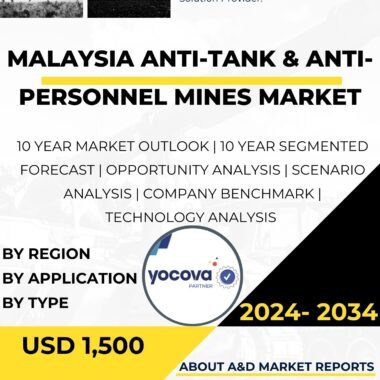Description
China Anti-Tank & Anti-Personnel Mines Market
The China anti-tank & anti-personnel mines market has experienced significant growth and development in recent years. Mines play a crucial role in modern warfare by providing area denial, protection, and strategic advantages. This market analysis provides an overview of the China anti-tank and anti-personnel mines market, including key players, market drivers, challenges, and future prospects.
The China anti-tank and anti-personnel mines market is characterized by the presence of both domestic and international players. These companies have invested in research and development to enhance the capabilities and performance of their mines to meet the specific requirements of the Chinese military.
International players, including renowned defense technology manufacturers such as Saab AB, Rheinmetall AG, and Leonardo S.p.A., have also established collaborations and partnerships in China. These collaborations have facilitated technology transfer, knowledge exchange, and joint development programs, contributing to the advancement of mine capabilities in China.
Firstly, China’s focus on military modernization and the enhancement of its defense capabilities has been a primary driver. Anti-tank and anti-personnel mines are essential for providing defensive and offensive capabilities in various combat scenarios. As China aims to develop a more advanced and capable military, the demand for advanced mine systems has grown.
Secondly, the need to improve force protection and deter enemy advancements has fueled the demand for anti-tank and anti-personnel mines in China. These mines provide effective area denial and protection by creating barriers and obstacles for enemy forces. By developing advanced mines with improved detection, activation, and neutralization capabilities, China can enhance its force protection and maintain a strategic advantage on the battlefield.
Technological advancements have played a crucial role in the growth of the China anti-tank and anti-personnel mines market. Domestic companies have focused on developing indigenous mine systems with advanced features and capabilities. China has made significant progress in the development of various types of mines, including blast mines, fragmentation mines, and directional fragmentation mines.
China has successfully developed and deployed advanced mine systems, such as the Norinco Type 72, which provides effective anti-tank capabilities with its blast and penetration effects. The development of fragmentation mines, such as the CASIC ZD-85, has improved China’s capabilities in engaging personnel and vehicles with lethal fragmentation effects. Additionally, directional fragmentation mines, such as the CSGC ZH-05, have been developed to provide precision engagement and enhanced lethality against specific targets.
Another driver of the China anti-tank and anti-personnel mines market is the civilian sector, including applications in fields such as demining, construction, and mining operations. Mine detection and neutralization technologies can be repurposed for civilian use, providing opportunities for dual-use applications. China’s growing need for mine clearance and safety measures in various industries has created a demand for mine detection and neutralization systems in non-military applications. The development of mine systems for civilian use provides opportunities for technology transfer and commercialization, further driving the growth of the market in China.
However, the China anti-tank and anti-personnel mines market also face certain challenges. One of the primary challenges is the need for continuous investment in research and development to stay ahead of evolving technologies, emerging threats, and changing battlefield conditions. As adversaries develop more advanced countermeasures and detection techniques, China must invest in innovation and advanced technologies to maintain its mine capabilities.
Additionally, the market faces challenges related to international export restrictions and arms control regulations. The development and export of mine systems are subject to strict regulations due to security concerns and international agreements. This can limit market opportunities and hinder collaboration with international partners.
Looking ahead, the future prospects for the China anti-tank and anti-personnel mines market are promising. China’s commitment to military modernization, force protection, and technological advancement will continue to drive investments in mine systems. Ongoing research and development efforts, collaborations between domestic companies and international partners, and the integration of emerging technologies, such as advanced sensors, detection algorithms, and self-neutralizing mechanisms, are expected to result in the introduction of more advanced and capable mine systems.
The integration of advanced technologies, such as robotics, artificial intelligence, and remote sensing, may shape the future of the market. These technologies can enhance the detection, neutralization, and deployment capabilities of mine systems, improving operational effectiveness and reducing risks to personnel. The development of intelligent mine systems, such as autonomous minefields and remotely controlled systems, can further enhance the strategic advantages and force protection capabilities provided by mine warfare.
In conclusion, the China anti-tank and anti-personnel mines market have witnessed significant growth driven by the country’s focus on military modernization, force protection, and technological advancement. Technological advancements, collaborations between domestic and international players, and the government’s commitment to indigenous defense capabilities have contributed to the development and deployment of advanced mine systems. Challenges related to evolving technologies, export restrictions, and arms control need to be addressed. With ongoing research and development, collaborations, and the integration of emerging technologies, the future of the China anti-tank and anti-personnel mines market looks promising, with opportunities for further growth, innovation, and advancements in mine capabilities.




